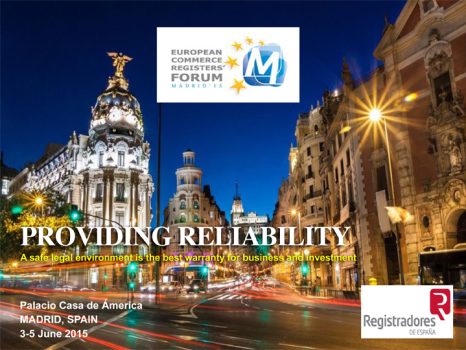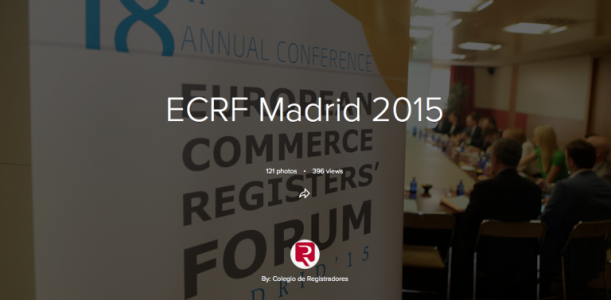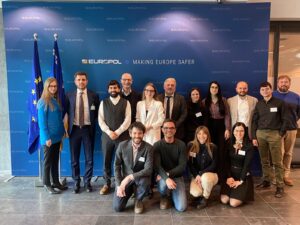2022 - Spain

The 18th Annual ECRF Conference, hosted by the Registrars of Spain (Colegio de Registradores de España), was held in Madrid, Spain, 3-5 June 2015.
Image Presentation
Conference Video
Watch the Conference Video
Conference Agenda
Read the Conference Agenda
Conference Participants
See the List of participants.
Conference Presentations
First Session: THE ROLE OF THE BUSINESS REGISTERS
- 1. The Role of Business Registers in the Economy, by Benito Arruñada, Dept. of Economics & Business, Pompeu Fabra Univ. & BGSE (Barcelona) – presentation
Presentation provides an analysis of the role and economic function of business registers, outlining the concepts and policy consequences of different contractual theories of the firm, out of which some ignore business registers, considering them unnecessary hurdles and barriers to incorporation, while others recognize business registers as market facilitators, which enable protection of third parties and, thereby, perform a socially valuable function that contributes to legal certainty and corporate contracting.
- 2. BRIS State of Play, by Magdalena Talaban, European Commission (via video connection) – presentation
Second Session: THE GLOBAL VIEW
- 3. The International Business Registers Report 2015, by Annika Bränström, Stacey-Jo Smith, Celia Johnston and Magdalena Norlin Schönfeldt, International Business Registers Survey Working Group – presentation
Presentation provides an overview of “The International Business Registers Report 2015” – a joint project of ASORLAC, ECRF, CRF and IACA – focusing on the most important findings and highlights that are outlined in more details in the chapters contained in the Report: Legal and Institutional Settings of institutions in charge of business registration [ways in which business registries (BRs) are organised and run and the structures thereof; the types of registered entities and assignment of unique identification numbers; registration of beneficial owners’ details and eligibility for accessing information on shareholders and beneficial owners; registering and/or deciding on bankruptcy and strike off; registration of branches; maintenance of Security Interest Registers]; Processing Time [time to process formations/incorporations and changes, and correlation between different formats of submitted documents and processing time]; Use of e-Services by Company Registries [usage of e-Services; correlation between e-Services and processing time; mandatory e-Services]; Funding and Fees [primary source of funding of BRs; application of the cost-covering principle by BRs in setting fees for the services they provide]; Business Dynamics [assessment of business climate of the regions observed by the Report on the basis of the number of entity registrations and terminations]; Information in the BRs [content, availability, use/reuse, quality, reliability and accessibility of information held by BRs; the demand for information; information services available on the BRs’ websites; and information made available by BRs]; Case Studies [Botswana; Colorado; Estonia; Suriname]; and Snapshots of 93 organisations/jurisdictions that participated in the 2014 International Business Registers Survey.
- 4. DB and beyond: the Regulation of Entry Revisited, by Andreja Marušić, World Bank Group (via video connection) – presentation
Presentation provides an overview of Investment Climate (IC) within the Trade & Competitiveness (T&C) global practice of the World Bank Group (WBG), outlining the core T&C Global themes, country typology solutions, outcomes, impacts, twin goals and the IC vision FY16; the scope of the DB Starting a Business indicator (time; cost; paid-in minimum capital; number of procedures to get a local limited liability company up and running) and the limitations thereof (formal sector only; biggest business city; specific company type – LLC; domestically owned business; specific industry – general commercial activities; number of employees – btw 10 and 50), as well as several case studies of DB rankings and relevant sustainability issues, which lead to the following conclusion: “Using Doing Business as an entry point is effective, as it allows governments to organize reforms around measurable indicators; in addition, however, reformers need to know what DB measures and focus beyond the DB indicator on all the relevant systemic issues that need to be tackled in order to secure a sustainable regime; the main objective of business registration reforms is not cutting steps or days but creating a sustainable, up-to-date and accurate business register, which can be the main building block in the business environment framework – linked to access to finance, collateral registry, and providing valuable data to policy makers”.
Third Session: THE BUSINESS REGISTER AS SUPPLIER OF LEGAL AND RELIABLE DATA
- 5. United Kingdom: Companies House, by Tim Moss, CEO and Registrar of Companies for England and Wales – presentation
Presentation raises the essential questions dealing with the purpose and role of business registers in the economy they are part of (what a registry can do to improve the integrity and quality of data, to ensure that data contained in a registry are complete, current and correct; how can a registry enable that it gets in the information as quickly and as efficiently as possible, ensure that it meets all statutory requirements, and then make it available and accessible to the public; how to achieve a balance between easy registration and integrity of data, between easy doing business and certainty of information, etc.), providing the UK Companies House perspective on how an easy registration process – combined with integrity and quality of information, ease of compliance, low costs, fast and easy access to data and interoperability of the relevant state authorities – makes limited liability work, enables corporate transparency and, thereby, supports the economy.
- 6. Norway: eGovernment in Norway – by Lars Peder Brekk, Director General, Brønnøysund Register Center – presentation
Presentation provides an overview of the Brønnøysund Register Centre (BRC), registration of business enterprises in Norway, electronic registration, digitalization, and ALTINN. Brønnøysund Register Centre is responsible for the management of 17 public registers, as well as for the development and operation of ALTINN – the national digital infrastructure and internet portal that links together registers, 41 public agencies, municipalities, 1 million business entities and 4 million inhabitants, facilitating information flow from business to government. The fact that 100% of Norwegian enterprises and 100% of Norwegians over the age of 15 have a user account in ALTINN makes it the most important digitalizing “motor” of Norway, which reduces costs of public authorities, as well as of business enterprises.
- 7. Serbia: The Business Register as Supplier of Legal and Reliable Data, by Zvonko Obradović, Director, Serbian Business Registers Agency – presentation
Presentation elaborates on business registers as suppliers of legal and reliable data that are of vital importance to the economy and different policy-makers, outlining the stages of business processes related to reception, procession and delivery of company data; the presentation also provides a brief summary of the development of the Serbian Business Registers Agency (SBRA) that celebrates its tenth anniversary in 2015, giving the overview of the SBRA registers (18), customers (1 million), and daily transactions the number of which has been increasing rapidly over ten years of its operation.
- 8. Spain: Providing Reliability, by Andrés Ylla, Business Registrar, International Affairs of Business Registers Department, Colegio de Registradores – presentation
Presentation emphasises the importance of business registers as sources of updated and accurate information on companies – the state authorities, private sector and investors can rely on – the value and integrity of which significantly differs from the company data originating from incompetent and, thus, unreliable sources that are publicly available elsewhere on the Internet; in this respect, the presentation outlines the set of extensive legal checks of documents and information subject to registration that Mercantile Register of Spain performs in order to secure that all legal requirements stipulated by the relevant laws are met, providing protection of third parties that rely on the information published in the register.
Fourth Session: THE ACCESSIBILITY AND USE OF DATA FROM THE BUSINESS REGISTER
- 9. France: The Accessibility and Use of Data from the Business Register, by Karla Aman, Manager Legal Affairs at the National Council of Commercial Courts Registrars, and Thomas Denfer, Legal Department Manager at the national platform Infogreffe – presentation
Presentation outlines the main features of the structure of the French business registration system (134 commercial courts, Business Registers and Registrars operating within them; the National Council), elaborating in more details on the French national platform “Infogreffe” (www.Infogreffe.fr) that was developed in 1986, in order to centralize and standardize information and data from all commercial courts, including the business register information, and make it available to the public, simplifying the access to information and the steps to create a company. In addition to providing an overview of the users of “Infogreffe” (companies; state administration) and the types of information it provides, it also outlines the French perspective of Open Data and Free Data.
- 10. Denmark: Data Use and Accessibility at the Danish Business Authority, by Kasper Sengeløv, Special Advisor, Danish Business Authority – presentation
Referring to the findings of some recent studies – which have shown that the data-driven economy, and big data in particular, has the potential to transform economies by raising revenue and productivity of companies – the presentation emphasizes the importance of the data driven innovations that ease decision-making, and provides an overview of the role that Danish Business Authority plays in this respect. In addition to summarising introduced novelties [Central Business Register (CVR): new user friendly registration of companies and annual accounts; new, cloud based, database; new, elastic, search engine; new interface for getting data (“CVR on Virk Data”); abolition of fees to access and download annual accounts (as of 1 January 2015) that are to be submitted in XBRL format (99%); introduction of obligation for companies to register (in the Public Shareholders’ Register) information on shareholders holding 5% or more of the company’s total share capital or voting rights], the presentation also outlines the Danish Business Authority’s activities aimed at increasing usage and accessibility of data (Hackathons; Data Catalogue; App Market).
- 11. Belgium: Belgian Enterprise Register – How We Distribute Our Data, by Adriaan Rosseel, Crossroads Bank for Enterprises – presentation
Presentation of the Belgian Enterprise Register deals with the two main topics: distribution of official company information and, more specifically, the Belgian “Responsibility through transparency” concept of open data. It also provides a general overview of the content of the register (1.5 million entities), administrative simplifications introduced in the business registration procedure (a unique entity identifier), outlining the basic functions and features of the KBO – the core system for simplification of company related processes and a key driver of improved government efficiency. The presentation outlines the Belgian “journey” towards transparency (2009 – 2014) and all requirements that needed to be met in this respect (political statement for more open government; legal work; technical development; organisational preparations; communications & PR campaigns aimed at raising public awareness of the value of open data), summarising the content of the KBO Open Data and results achieved up to June 2015.
- 12. The Global Legal Entity Identifier System, by Stephan Wolf, CEO, Global LEI Foundation (GLEIF) – presentation
Presentation provides an overview of the fundamental principles of the Legal Entity Identifier – LEI (a 20-digit reference code to uniquely identify legally distinct entities that engage in financial transactions and associated reference data), the Financial Stability Board’s recommendations for the development of a Global LEI System (GLEIS), creation of the Regulatory Oversight Committee (ROC) and the establishment of the Global LEI Foundation – GLEIF, in June 2014. It explains how LEIs are being issued by Local Operating Units (LOUs) that operate on a “non-profit cost-recovery model”, elaborating in more details on the GLEIF’s main functions (Rulemaking; Operational; and Monitoring) and its responsibility for setting up the legal network – GLEIS. It also indicates who could become a potential GLEIS participant (regulators; market data vendors; technical facilitators; financial market intermediaries; business registrars; audit firms; notaries public, etc.) and what additional services might be offered.
Fifth Session: TECHNOLOGY FOR PROVIDING RELIABLE SERVICES
- 13. e-IDs and the eIDAS – Regulation, by Johannes Hushahn, German Federal Chamber of Notaries – presentation
Presentation outlines the existing legislative framework [Regulation (EU) No. 910/2014 on electronic identification and trust services (eIDAS) for electronic transactions in the internal market; 26 implementing acts (out of which four deal with eIDs); and one delegated act that is to be issued by the European Commission] aiming at ensuring legal certainty and mutual recognition of eIDAS as key enablers of interoperable e-government services across the European Union, securing electronic interaction between citizens, businesses and public authorities. Referring to the scope of subject regulation, which stipulates that “eIDAS does not affect legal or procedural obligations relating to form” and “national form requirements or public registers are not affected”, the presentation emphasizes that it does not mean that eIDs and eIDAS regulations have no effect on public registers whatsoever, specifying that if there are national form requirements they cannot be overruled by eIDAS regulations.
- 14. From the Company to the Register and from the Register to the Company, by Ingmar Vali, Centre of Registers and Information Systems, Estonia – presentation
Presentation provides an overview of online business registration in Estonia, outlining key preconditions necessary in this respect [Internet availability; electronic identity (password vs public key technology); legislation (Electronic Signature Act); Political will (reforms using IT); Data exchange policy Gov2Gov)], as well as main features of the policy that changed Estonian system of company registration, allowing entrepreneurs to register their new business online in just 18 minutes, without ever having to go to a notary or government office. Nowadays, as a result of such an advanced and innovative system of online business registration, 95% of companies are established over the Internet, in a self-service. The presentation also provides details about e-Residency (launched on 1 December 2014), a transnational digital identity which offers every world citizen a government-issued digital identity (smart ID card), enabling them (e-Residents) to use the services provided by Estonian state agencies and private sector, and run and manage trusted company online.
- 15. Spanish Business Register – Contribution to the Digital Economy – Open Government Approach, by Luis Lahoz, CIO, Colegio de Registradores de España – presentation
Presentation provides an overview of how the Spanish Business Register has been contributing to the digital economy and how it has been steadily increasing the offer of new digital services and number of its users over the years (1999 – 2014), using an open government approach; it also outlines the overall achievements of Spain in the digital public services – the dimension where Spain performs best of all DESI (Digital Economy and Society Index) 2015 dimensions, being ranked 6th among the EU countries; the presentation also specifies the main objectives of the new 2016-2012 eGovernment Action Plan, proposed in the Digital Single Market (DSM) Strategy for Europe, published by the European Commission in May 2015.
- 16. XBRL for Business Registers, xEBR Working Group, by Iñaki Vázquez – presentation
In addition to providing an overview of XBRL, XBRL Europe, the European System of Financial Supervision (ESFS) and XBRL Spain, the presentation provides detailed information about the XBRL Europe Business Registers Working Group – xEBR, created in order to increase coordination and interoperability for XBRL efforts and taxonomies for European business registers and company information providers, aiming at connecting everyone in Europe working on the electronic filing, exchange, publishing and analysis of registered legal, financial and economic data of companies that use XBRL as a relevant standard. Aiming at supporting the interconnection of the European business registers and company legal/financial data, the core project of the xEBR is to develop the xEBR Taxonomy, but it has been also engaged in several pilot projects [Cross – Branches (Bundesanzeiger); and Comparing Data].
- 17. EBOCS Overview, by Kevin Kerrigan, Director, Tower 81 – presentation
Presentation is an overview of the status of EBOCS (European Business Ownership and Control Structures) project, carried out with the financial support of the “Prevention of and Fight against Crime Programme” European Commission – Directorate-General Home Affairs, and coordinated by the European Business Register EEIG (Belgium); it is specifically targeted towards public Counter Crime Agencies (CCAs), such as Financial Investigation Units (FIU) and Law Enforcement Agencies (LEA) that are involved in the fight against financial and economic crime; project objective is to develop prototype IT data services to provide simplified and unified access to BR data on business ownership and control structures for financial analysis and investigation purposes.
Sixth Session: NEW DEVELOPMENTS IN EUROPEAN BUSINESS REGISTERS
- 18. Albania: Albanian Commercial Registry, by Vasilika Vjero, General Director, National Registration Center – presentation
Presentation gives a brief overview of the rationale for business registration reform in Albania, aimed at making the registration of businesses less cumbersome, less costly and thus more efficient, providing an overview of the former business registration system and all improvements achieved by the establishment of the National Registration Centre (NRC) that is responsible for the management of the Commercial Register. The presentation provides details of the NRC’s and Commercial Register’s functions and services, businesses incorporation procedure and new developments (on-line registration – available as of December 2014; improved performances of the webpage search engine; introduction of the new search tool – the Bulletin of Business Registration, which generates all the data registered in the Commercial Register within last 24 hours).
- 19. Croatia: Competitive Croatia – Business Registers in Croatia, by Andrea August, Director, Sector for Competitiveness, Agency for Investments and Competitiveness – presentation
In addition to outlining the main tasks and objectives of the Croatian Agency for Investments and Competitiveness – AIC (supporting investors and promoting Croatia as investors’ destination; improving business environment by proposing regulatory and tax changes; coordinating Doing Business based reforms; supporting EU semester reforms; enhancing transparency and quality of business data; developing innovative financial mechanisms for SMEs; reducing administrative burden; RIA process support; approving and monitoring implementation of public private partnership projects; etc.), the presentation provides an overview of the business registration state of play in Croatia, indicating existing challenges and future plans in the business registries domain. While recognizing that there is no one-size-fits-all recipe, experiences and lessons learned in other countries can inspire the reform process in countries engaged in business environment reforms.
- 20. Poland: National Court Register, by Tomasz Kostela, Chief Expert, Ministry of Justice of the Republic of Poland, Department of Computerisation & Court Registers – presentation
Presentation provides a general overview of the National Court Register (NCR) launched on 1 January 2001, which comprises: Register of Entrepreneurs (companies and partnerships); Register of associations, social & professional organisations, foundations & independent public health-care establishments; and Register of insolvent debtors. Data on enterprises operated by natural persons are not contained in NCR but in other database that is maintained by the Ministry of Economy. The presentation also outlines the key features of the NCR’s high-level architecture, as well as its most important services: a web incorporation service – which enables an alternative procedure for registration (incorporation) of limited liability companies, partnerships and limited partnerships in easiest and cheapest way that does not and require authorization by a notary; and service that enables a free of charge online access to valid up-to-date data on registered entities. The presentation also summarises activities that NRC has been undertaking with respect to interconnection with BRIS platform.
- 21. Portugal: Commercial Registry Reform in Portugal – A Paradigm Shift…, by Filomena Rosa, Business Registrar and Coordinator of International Affairs, Institute of Registries and Notaries of Portugal – presentation
Presentation provides details of the major goals (cutting red tape; reducing costs; improving competitiveness) and key factors (introduction of the Commercial Registry Information System- SIRCOM; human capacity building; process reengineering with consequent alteration of the legal framework) that led to the successful implementation of the Commercial Registry reform in Portugal (2005). It outlines the types of available single window services – On the Spot Firm; On the Spot Branch; and On the Spot Association (in 2006, the On the Spot Firm Project won the European Enterprise Award, handed out by EC for excellence in the “red tape reduction” category; In 2007 Doing Business Report of the World Bank Portugal was a “Top Reformer” country). The presentation also provides an overview of online services – Permanent Business Certificate; Simplified Company Information; and Online Company.
Seventh Session: UPDATE FROM INTERNATIONAL REGISTERS ORGANIZATIONS
- 22. ASORLAC, by Martin Salcedo, Bogotá Chamber of Commerce – presentation
Presentation of the history, objectives, benefits, structure and members of the Association of Latin American and the Caribbean Registrars – ASORLAC (www.asorlac.org), a non-profit organisation that pursues to promote regional integration of Business Registrars of Latin America and the Caribbean, aiming at strengthening the competitiveness in the business sector; the presentation also outlines the topics discussed at the ASORLAC General Meeting held in Bogota, in September 2014 (electronic document; electronic signature; personal data protection in the business registry activities) and provides information about the program developed by the International Finance Corporation (IFC), the Tax and Customs Authority Office of Columbia (DIAN), the Secretary Treasure Office, ASORLAC and the Bogota Chamber of Commerce, aiming at simplifying the payment of taxes and other social security contributions for employment and promoting creation and formalization of companies.
- 23. International Association of Commercial Administrators (IACA), by Allison DeSantis, IACA President, Director of Business Services, Ohio Secretary of State’s Office; and Hayley Clarke, IACA President –Elect, Director of Business Programs, Service Nova Scotia and Municipal Relations – presentation
In addition to providing an overall information about the International Association of Commercial Administrators – IACA (www.iaca.org), which gathers business register organizations and secured transaction registry operations, and is divided into the three sections (Business Organization Section – BOS; Secured Transactions Section – STS; and Information Technology Section – ITS), the presentation outlines some of the topics discussed at the 38th IACA Annual Conference held in Savannah, Georgia, from the 17th to the 22nd of May 2015 (Data Sales; Business Metrics; Trademarks & Trade Dresses; Series Entities; Beneficial Ownership; Personal Property Registries; Promoting Electronic Filing; etc.), which was attended by 225 delegates – representatives of government and industry from 6 Canadian provinces, 42 US states and 18 additional countries; it also provides the basic information on the 39th Annual IACA Conference that will be held in Columbus, Ohio, from the 5th to the 9th of June 2016.
- 24. CRF – Corporate Registers Forum, by Tim Moss, CRF President – presentation
In addition to providing an overview of the role and aim of the Corporate Registers Forum – CRF (www.corporateregistersforum.org), an international business registry organisation that gathers 53 member jurisdictions from 5 continents, the presentation summarises the topics discussed at the 11th Annual CRF Conference held in Abu Dhabi in March 2015 (Registration good practice in the Middle East; Streamlining company registration; Business registration as a driver for economic growth; Director disqualification; Registry structures; Open data; International benchmarking; iXBRL; Unique identifiers; Future plans for CRF), which was attended by 250 delegates from 60 countries; it also provides the basic information on the first joint CRF and ECRF conference, scheduled to be held in Cardiff (May 9 – 13, 2016), as well as some topics of the agenda thereof, which aims at mixing up global and regional issues, such as: collection of data; the whole process in running the BRs; quality, enforcement & integrity of data; and the usage of the data.
- 25. ECRF | CRF Conference | 2016, by Annika Bränström, ECRF President and Tim Moss, CRF President – presentation
Presentation outlines the basic information of the first joint CRF & ECRF conference that will be hosted by Companies House, in Cardiff (Wales), from the 9th through the 13th of May 2016.



